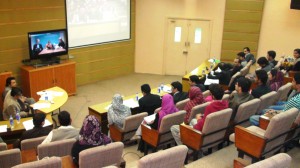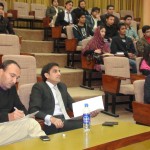Seminar on challenges, prospects and constraints for SMEs development in Khyber Pakhtunkhwa and FATA
January 27, 2013
by Javed Iqbal
 The INSPIRE project is being jointly managed by IMSciences and University of Southampton having a range of objectives to strategically bring the two institutions and regions in close contact and ready exchange. A couple of the Project’s objectives include creation of research/evidence based knowledge on SMEs development in Pakistan, and facilitating relationships between HEIs, industry and relevant governmental organizations. There is a dearth of linked and in-depth knowledge on SMEs in this severely conflict-affected region of Pakistan. Researchers at both institutions are in the process of evaluating various options where excellent research expertise from University of Southampton could be used in advancing greater understanding of SMEs Eco-system in this troubled region.
The INSPIRE project is being jointly managed by IMSciences and University of Southampton having a range of objectives to strategically bring the two institutions and regions in close contact and ready exchange. A couple of the Project’s objectives include creation of research/evidence based knowledge on SMEs development in Pakistan, and facilitating relationships between HEIs, industry and relevant governmental organizations. There is a dearth of linked and in-depth knowledge on SMEs in this severely conflict-affected region of Pakistan. Researchers at both institutions are in the process of evaluating various options where excellent research expertise from University of Southampton could be used in advancing greater understanding of SMEs Eco-system in this troubled region.
A seminar was held to augment this understanding and to kick start a process of outreach to key stakeholders in government, aid agencies, private sector, and academic institutions.
Those who participated in the seminar include the following;
1- Sarmad Hussain, Manager SMEDA
Key topics discussed by Mr. Sarmad included most potential sectors & key interventions by SMEDA in the past 5 years, a review of sectors specific challenges, government-supported programs for SMEs development, donors’ driven projects & programs, and how conflict challenges entrepreneurship in the region.
2- Mr. Mujahid Saleem Farooqi, Economic Growth Specialist, USAID
Mr. Farooqi spoke at length about USAID’s support to SMEs in the region in wake of on-going militancy and in the aftermath of 2010 floods. He contributed an eloquent narrative of donors’ perspective on SMEs development and termed the economic development agenda of donors contributing to peace building in the region. Mr. Farooqi identified a lack of capacity across various levels in government, private sector, civil society, and aid agencies as the main impediment to development of promising economic sectors and industry in the region.
3- Mr. Asad Mahmood, Off-farm Economist, FATA Secretariat
Mr. Asad talked at length about the Post Crisis Needs Assessment (PCNA) and the challenges that their organization faces in implementation starting from the very political nature of FATA in Pakistan’s polity. Various attempts at promoting SMEs in the past have not produced substantial results owing to a lack of reforms at all levels.
4- Mr. Faheem khan, student entrepreneur
Faheem started an interior décor outfit recently and has already got work within IMSciences and outside. Under the guidance of EDC at IMSciences, he has successfully incubated his idea in presence of able support from faculty and fellow students. He talked about his experiences as a young entrepreneur in a region full of uncertainties and termed a lack of enabling environment as the key entry challenge for young entrepreneurs.
5- Ms. Nabeela , Supervisor at WBDC, Peshawar
Ms. Nabeela works as display supervisor at the Women Business Development Centre in Peshawar and termed the existing cultural and social perceptions towards working women as the biggest impediment challenging women mainstreaming in SMEs in the region. She termed the “funnel” approach of women entrepreneurs to only focus on traditional sectors such as fashion and jewellery as a disaster recipe and called for creative thinking in such a big local market.
6- Mr. Qazi Waheed, Coordinator EDC, IMSciences
Mr. Qazi is an enthusiastic youth promoter and has decent success in incubating a few enterprises at IMSciences. He called for more donor’s and industry’s interest in working with academic institutes to harness the potential of youth and a stronger focus on commercialization and scaling of innovative ideas coming out of HEIs.
The panel interacted with Dr. Lorraine Warren, Jo L Nesbitt, and Andrew Bird at University of Southampton through video conferencing. Dr. Lorraine contributed significant ideas to the discussion and thanked all for their time and support. Dr. Muhamamd Nauman and Mr. Javed Iqbal moderated the discussion at IMSciences.





